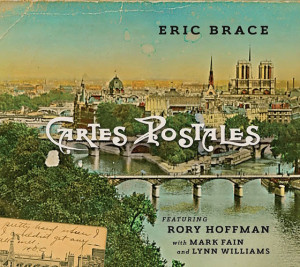 I’ve been reviewing the music of Eric Brace for perhaps 15 years now, and I didn’t think he could surprise me much. I’ve enjoyed him solo and in various permutations – with his band Last Train Home, with Peter Cooper as a duo and with others in tow …. Now out of left field comes his latest project, an album of songs in the French chanson tradition. It might be my favorite one yet.
I’ve been reviewing the music of Eric Brace for perhaps 15 years now, and I didn’t think he could surprise me much. I’ve enjoyed him solo and in various permutations – with his band Last Train Home, with Peter Cooper as a duo and with others in tow …. Now out of left field comes his latest project, an album of songs in the French chanson tradition. It might be my favorite one yet.
Who knew Mr. Brace, current resident of Nashville and late of Washington, D.C., had an album’s worth of French songs in him? When you learn the backstory, though, it all makes sense. His father, Paul Brace, was the son of a French woman and an American man. Paul lived with his mother through World War II in Paris and Lyon, and arrived in America in 1947 at the age of 24. Through his dad’s records and some time spent living in France as a teenager, Eric learned to love the jaunty, blue music of the Paris cafés and the Gypsy jazz of Reinhardt and Grappelli.
Brace brings his warm and craggy baritone to 10 of these songs, many of which you may recognize at least the melody, because some have been minor hits on American radio back in the olden days. The song called “Savoir Aimer,” for instance, has a melody known better in America as “Stranger On The Shore,” and was both an instrumental and vocal hit in the early 1960s, the latter for Andy Williams. And “Si Tu Vois Ma Mère” by Sidney Bechet was used in Woody Allen’s Midnight in Paris, though an instrumental version.
And of course there’s Django Reinhardt’s “Nuages,” which lots of Americans have heard, possibly in Yves Montand’s version from the ’60s. Brace sings a lovely French version in a place of honor on the second track (following Bechet’s delightful “Petite Fleur”), and closes the album with an absolutely wonderful version in English. The first time I heard this (in the car, I confess) I found the lyrics so subtly poetic that I couldn’t wait to get home to see who had done the translation. As it turns out, Brace didn’t care for any of the existing English translations of Jacque’s Larue’s lyrics, so he did his own! Bravo, M. Brace! Bien joué.
One would be remiss in neglecting to mention the musical setting of these lovely songs. Brace is backed by a jazz rhythm section of Mark Fain on bass and Lynn Williams on drums, but the entire enterprise hinges on the astounding talent of one Rory Hoffman. I’m not sure I’ve encountered Mr. Hoffman before, which is my loss! He plays guitar, accordion, clarinet, tenor sax, piano, harmonica and banjo, all with equal skill and grace, and to top it off whistles like nobody’s business. Brace refers to him as “one of the most extraordinary musical talents of our time” in a press release, and I have to agree.
The whole affair is documented in a 16-page booklet containing lyrics and notes on each song, and both booklet and the CD digipak are filled with images of old postcards from Paris, the “cartes postales” of the album’s title. It’s seriously worth picking up the CD rather than just streaming or downloading this one. It’s a beautiful project all around, so pour yourself a glass of red wine, or perhaps absinthe, put on Eric Brace’s Cartes Postales and be transported to a cafe on the banks of the Seine for an all-too-brief moment.
(Red Beet, 2017)
